
Product images may vary slightly from actual product.
56”/ 48” Brahm LED
INSTRUCTION MANUAL
Model# 300044, 300048
READ AND SAVE THESE INSTRUCTIONS

SAFETY RULES…………………………………………………………………….....3
TOOLS REQUIRED………………………………………………………………….5
PACKAGE CONTENTS……………………………………………………………5
MOUNTING OPTIONS……………………………………………………………6
HANGING THE FAN………………………………………………………………...7
INSTALLATION OF SAFETY SUPPORT……………………………….9
ELECTRICAL CONNECTIONS……………………………………………..10
FINISHING THE MOTOR INSTALLATION……………………………...11
ATTACHING THE FAN BLADES……………………………………………...12
INSTALLING THE SWITCH HOUSING……………………………………13
INSTALLING THE LIGHT KIT AND GLASS……………………………..14
INSTALLING THE COOLTOUCH CONTROL
SYSTEM WALL PLATE……………………………………………………………..15
INSTALLING AND REMOVING THE HANDHELD
TRANSMITTER………………………………………………………………………....16
OPERATING INSTRUCTIONS…………………………………………………16
REVERSE FUNCTION………………………………………………………………18
FCC INFORMATION…………………………………………………………………18
TROUBLESHOOTING………………………………………………………………19
TABLE OF CONTENTS
2 | KICHLER.COM

SAFETY RULES
CAUTION – RISK OF SHOCK – Disconnect Power at
the main circuit breaker panel or main fusebox before
starting and during the installation.
WARNING: All wiring must be in accordance with the
National Electrical Code “ANSI/NFPA 70” and local
electrical codes. Electrical installation should be
performed by a qualified licensed electrician.
WARNING: To reduce the risk of electric shock, this fan
must be installed with a general-use, isolating wall
control/switch.
WARNING: Not suitable for use with solid-state speed
controls.
WARNING: Chemical Burn Hazard. Keep batteries
away from children.; andThis product contains a
lithium button/coin cellbattery. If a new or used lithium
button/coin cellbattery is swallowed or enters the
body, it can causesevere internal burns and can lead to
death in as littleas 2 hours. Always completely secure
the batterycompartment. If the batterycompartment
does notclose securely, stop using the product,
1.
2.
3.
4.
5.
remove thebatteries, and keep it away from children. If
you thinkbatteries might have been swallowed or
placed insideany part of the body, seek immediate
medical attention.
a) The cells shall be disposed of properly,
includingkeeping them away from children; and
b) Even used cells may cause injury.
WARNING: To reduce the risk of fire, electric shock, or
personal injury, mount to outlet box marked
“acceptable for fan support of 15.9 kg (35 lbs.) or less”
and use mounting screws provided with the outlet box.
Most outlet boxes commonly used for the support of
light fixtures are not acceptable for fan support and
may need to be replaced. Due to the complexity of the
installation of this fan, a qualified licensed electrician is
strongly recommended.
The outlet box and support structure must be securely
mounted and capable of reliably supporting a minimum of
15.9 kg (35 pounds). Use only cULus Listed outlet boxes
marked “Acceptable for Fan Support of 15.9 kg (35 lbs) or less”.
6.
7.
56”/ 48” Brahm LED | 3

WARNING
TO REDUCE THE RISK OF PERSONAL INJURY, DO NOT BEND
THE BLADE DURING ASSEMBLY OR AFTER INSTALLATION.
DO NOT INSERT OBJECTS IN THE PATH OF THE BLADES.
SAFETY RULES
The fan must be mounted with a minimum of 2.1 m (7 feet)
clearance from the trailing edge of the blades to the floor.
To operate the reverse function on this fan, press the
reverse button while the fan is running.
Avoid placing objects in the path of the blades.
WARNING: make sure the power is disconnected
before cleaning your fan.
To avoid personal injury or damage to the fan and
other items, be cautious when working around or
cleaning the fan.
Do not use water or detergents when cleaning the fan
or fan blades. A dry dust cloth or lightly dampened
cloth will be suitable for most cleaning.
After making electrical connections, spliced
conductors should be turned upward and pushed
carefully up into outlet box. The wires should be spread
apart with the grounded conductor and the
equipment-grounding conductor on one side of the
outlet box and the ungrounded conductor on the other
side of the outlet box.
Electrical diagrams are reference only. Light kits that
are not packed with the fan must be cULus Listed and
marked suitable for use with the model fan you are
installing. Switches must be cULus General Use
Switches. Refer to the Instructions packaged with the
light kits and switches for proper assembly.
All set screws must be checked, and retightened where
necessary, before installation.
The subject fan weight information is as below:
8.
9.
10.
11.
12.
13.
14.
15.
16.
17.
Model
300044
300048
Net Weight
(kgs)
Gross Weight
(kgs)
Net Weight
(lbs)
Gross Weight
(lbs)
9.18 10.22 20.21 22.50
7.58 8.48 16.68 18.66
4 | KICHLER.COM

TOOLS AND MATERIALS REQUIRED
PACKAGE CONTENTS
•Phillips Screwdriver
•Blade Screwdriver
•11 mm Wrench
•Step Ladder
•Wire Cutters
Unpack your fan and check the contents. You should have the following items:
A. Mounting Bracket
B. Ball / Downrod Assembly
C. Canopy
D. Canopy Hole Cover
E. Coupling Cover
F. Motor Body
G. Fan Blade (5)
H. Switch Housing
I. Light Kit
J. Glass
A
B
C
D
E
F
G
I
J
H
L
K. Wall control Kit:
Receiver (1), Control (1), Metal Plate (1),
Wire connector (6), Wood Screw (2),
Battery (2), Long Screw (2),
Short Screw (2), Expansion Anchor (2),
Plastic Nut (2)
K
L. Package Hardware
1) Mounting Hardware:
Wire Connectors (3)
2) Blade Attachment Hardware:
Screws (15), Washers (15)
3) Safety Cable Hardware:
Wood Screw (1)
Spring Washer (1)
Flat Washer (1)
56”/ 48” Brahm LED | 5

MOUNTING OPTIONS
If there isn’t an existing UL (cUL for Canadian Installation) listed
mounting box, then read the following instructions. Disconnect
Secure the outlet box directly to the building structure. Use
appropriate fasteners and building materials. The outlet box
and its support must be able to fully support the full weight of
the fan (up to 15.9 kg (35 lbs.)). Do not use plastic outlet boxes.
outlet box.
NOTE: If you are installing the ceiling fan on a sloped (vaulted)
ceiling, you may need a longer downrod to maintain proper
clearance between the tip of the blade and the ceiling. A
minimum clearance of 12" is suggested for optimal operation.
NOTE: Depending on the location you have selected for
installation, you may need to purchase and install a “Joist
Hanger” for the support of the outlet box. Make sure the joist
hanger you purchase has been designed for use with ceiling
fans. (Fig. 4)
Fig. 1
Outlet box
Outlet box
Fig. 2
Fig. 3
Fig. 4
Outlet box
Recessed
outlet box ceiling
mounting
plane
Provide strong
support
ANGLED CEILING
MAXIMUM 20° ANGLE
6 | KICHLER.COM

HANGING THE FAN
To properly install your ceiling fan, follow the steps below.
Step 1. Before attaching fan to outlet box (not included), ensure the outlet box is securely
fastened to at least two points to a structural ceiling member (a loose box will cause the
fan to wobble). Pass the 120 volt supply wires from the ceiling outlet box through the
center of the ceiling mounting bracket. Install mounting bracket to outlet box in ceiling
using the screws and washers included with the outlet box. (Fig. 5)
Step 2. Remove the hairpin and clevis pin from the downrod assembly, retain for later use.
Remove the hanger ball from the downrod assembly by loosening set screw, removing
NOTE: Make sure to keep loosened hardware separate to avoid confusion during
installation.
Step 3. Loosen the two set screws on the motor coupling. (Fig. 7)
Outlet Box
Fig. 5
Fig. 6
Fig. 7
Ceiling Mounting Bracket
Flat Washer
Screw
Hanger Ball
Set Screw
Cross Pin
Hairpin
Clevis Pin
REMEMBER to turn o the power before you begin installation. This is necessary for
your safety and also the proper programming of the control system.
Set Screw
Motor Body
56”/ 48” Brahm LED | 7

HANGING THE FAN (continued)
Step 4. Carefully feed fan wires and safety cable up through the downrod.
Thread the downrod onto the motor coupling until the clevis pin holes are
aligned. Next, replace the clevis pin and hairpin, then tighten both set screws.
(Fig. 8)
Step 5. Slip the coupling cover, canopy hole cover and canopy onto the
downrod. Carefully reinstall the hanger ball onto the downrod. Make sure the
cross pin is in the correct position and the set screw is tight and the wires are
not twisted. (Fig. 9)
Step 6. Now lift the motor body into position and place the hanger ball into
the mounting bracket. Rotate until the “Check Tab” has dropped into the
“Registration Slot” and seats firmly. (Fig. 10) The entire motor body should
not rotate if this is done correctly.
WARNING: Failure to properly seat the “Check Tab” can damage the ceiling
fan during operation.
Fig. 8
Clevis Pin
Clip
Set Screw
Clevis Pin
Motor Body
Clip
Set Screw
Fig. 9
Cross Pin Set Screw
Hanger Ball
Canopy
Canopy Hole Cover
Coupling Cover
Motor Body
Fig. 10
Mounting Bracket Hanger Ball
Registration Slot
Check Tab
8 | KICHLER.COM

Flat Washer
INSTALLATION OF SAFETY SUPPORT
(required for Canadian installation ONLY)
A safety support cable is provided to help prevent the ceiling fan from faIling, please
install it as follows.
Step 1. Drive a wood screw and washers into the side of the brace that holds the outlet
box. Leave 3mm (1/8") of space between the support brace and the washer. (Fig. 11)
Step 2. Insert the safety cable through the mounting bracket and one of the holes in
the outlet box into the ceiling. Adjust the length of the safety cable to reach the screw
and washers by pulling the extra cable through the cable clamp until the overall length is
correct, put the end of the cable back through the cable clamp, forming a loop at the end
of the cable. Tighten the cable clamp securely. Now, put the loop in the end of the safety
cable over the wood screw and under the washer. Tighten the wood screw securely.
(Fig. 12)
NOTE: Although the safety support cable is required for Canadian installations only.
It’s a good idea to make the attachment with any installation.
Wood Screw
Spring Washer
Outlet Box
Ceiling
Support Brace
Safety Cable Bolt
Wood Screw
Fig. 12
Fig. 11
56”/ 48” Brahm LED | 9

MAKE THE ELECTRICAL CONNECTIONS
WARNING:
the main circuit panel before wiring.
To avoid possible electrical shock, be sure you have turned o the power at
Follow the steps below to connect the fan to your household wiring. Use the wire
connectors supplied with your fan. Secure the connector with electrical tape. Make sure
there are no loose wire stands or connections.
WARNING:
immediately. A professional electrician is recommended to determine proper wiring.
If your house wires are dierent colors than referenced in this manual, stop
Step 1. Insert the receiver into the mounting bracket, and keep flat in opposition of
ceiling. (Fig. 13)
Step 2. Motor to Receiver Electrical Connections: Connect the BLACK wire from the fan
to BLACK wire marked “TO MOTOR L” from the receiver. Connect the WHITE wire from
the fan to the WHITE wire marked “TO MOTOR N” from the receiver. Connect the BLUE
wire from the fan to the BLUE wire marked “FOR LIGHT “ from the receiver. Secure all
the wire connections with the plastic wire connectors provided. (Fig. 14)
Step 3. Remote Receiver to Outlet Box Electrical Connections: Connect the BLACK (hot)
wire from the ceiling to the BLACK wire marked “AC IN L” from the receiver. Connect
the WHITE (Neutral) wire from the ceiling to the WHITE wire marked “AC IN N” from the
receiver. Secure all the wire connections with the plastic wire connectors provided.
(Fig. 14)
Mounting
Bracket
Fig. 14
Receiver
Fig. 13
Outlet box
Black White
Green or bare
copper (ground)
Black (“AC IN L”)
Receiver
Black (“TO MOTOR L”)
Black (motor)
Blue (FOR LIGHT)
Blue (FOR LIGHT)
White (“AC IN N”)
White (“TO MOTOR N”)
Ground wire
White (Neutral)
10 | KICHLER.COM

MAKE THE ELECTRICAL CONNECTIONS
Step 4. If your outlet box has a ground wire (green or bare copper) connect it to
the fan ground wires: otherwise connect the fan ground wire to the mounting
bracket. Secure the wire connection with a plastic nut provided. After connecting
the wires, spread them apart so that the green and white wires are on one side of
the outlet box and black and blue wires are on the other side. (Fig. 14)
NOTE: Carefully tuck the wire connections up into the outlet box.
NOTE: Fan must be installed at a maximum distance of 30 feet from the
transmitting unit for proper signal transmission between the transmitting unit
and the fan’s receiving unit.
FINISHING THE MOTOR INSTALLATION
Step 1. Remove one of the two shoulder screws in the mounting bracket. Loosen
the second shoulder screw without fully removing it. (Fig. 15)
Step 2. Assemble canopy by rotating key slot in canopy over shoulder screw in
mounting bracket. Reinstall the shoulder screw that was previously removed,
then retighten two shoulder screws securely. (Fig.16)
Mounting Bracket
Fig. 15
Fig. 16
Shoulder Screw
Canopy
Shoulder Screw
56”/ 48” Brahm LED | 11

FINISHING THE MOTOR INSTALLATION
Step 3. Securely attach and tighten the canopy hole cover over the shoulder
screws in the mounting bracket utilizing the keyslot twist-lock feature. (Fig. 17)
ATTACHING THE FAN BLADES
CAUTION: Before continuing, make sure the power is disconnected by turning o
the circuit breaker or removing the fuse at the circuit box.
Step 1. Carefully slide the blade through the slot as shown. Securely fasten the
five blades with blade screws and flat washers. (Fig. 18)
Fig. 18
Blade
Blade Screw
Flat Washer
Shoulder Screw
Canopy Hole Cover
Fig. 17
12 | KICHLER.COM

INSTALLING THE SWITCH HOUSING
Step 1.
CAUTION: To Reduce The Risk Of Electric Shock, Disconnect The Electrical
Supply Circuit To The Fan Before Installing Switch Housing.
Remove the screw marked with a dot label which is preinstalled on
mounting plate and keep for later use. Loosen the other two (do not remove).
Place the two slot holes on the switch housing over the 2 screws previously
loosened from the mounting plate. Rotate the switch housing until it locks in
place at the narrow end of the key holes. Secure by tightening the 2 screws
previously loosened and the one previously removed. (Fig. 19)
Screw
Fig. 19
Switch Housing
Mounting Plate
56”/ 48” Brahm LED | 13

INSTALLING THE LIGHT KIT AND GLASS
CAUTION:
o at the main circuit breaker or by removing the circuit fuse. Turning the power
Before continuing installation, confirm that the power is still turned
o using a wall switch is not sucient to prevent electrical shock.
Step 1. Hold the light kit close to the switch housing and connect the WHITE
wires from the light kit and fan by pushing the connectors together. Follow the
same procedure with the BLACK wires. (Fig. 20)
Step 2. Tuck the connections neatly into the light kit. Remove one of three
screws pre-installed on the switch housing and keep for later use. Loosen the
other 2 screws (do not remove). Place the two slot holes on the light kit over
the 2 screws previously loosened from the switch housing. Rotate the light kit
until it locks in place at the narrow end of the key holes. Secure by tightening
the 2 screws previously loosened and the one previously removed. (Fig. 20)
Step 3. Secure the glass to switch housing by twisting in a clockwise direction,
twist the glass gradually until it snaps on to the switch housing. Do not over -
tighten. (Fig. 21)
Glass
Fig. 20
Fig. 21
Light Kit
14 | KICHLER.COM

CAUTION: MAKE SURE THE ELECTRICITY IS TURNED OFF AT THE MAIN JUNCTION
BOX OR THE CORRECT FUSE HAS BEEN PULLED OFF AT THE MAIN JUNCTION BOX
BEFORE CONTINUING.
WARNING: All wiring must be in accordance with the National Electrical Code local
electrical codes. Electrical installation should be performed by a qualified licensed
electrician.
Select a location to install your “CoolTouch” Control System Transmitter. You can replace
an existing wall switch, or install the transmitter on ANY flat surface.
WARNING: SWITCH INSTALLATION MUST COMPLY WITH ALL LOCAL AND
NATIONAL ELECTRIC CODES.
Option 1. Install the control system using an existing wall switch outlet box.
Make sure the electrical power is TURNED OFF at the main panel before wiring.
Step 1. Remove the existing wall plate and the old switch from the wall outlet box. Wire the
BLACK leads (hot) together with connector and push back inside the outlet box. (Fig. 22)
Step 2. Install the metal plate and “CoolTouch” wall plate to the existing wall outlet box
with 4 screws provided. Then place the two plastic plugs into the wall plate. (Fig. 23)
Option 2: Install the control system on ANY flat surface:
Select the desired location and use the “CoolTouch” wall plate to make the location for the
mounting holes. Plastic wall anchors and screws are provided for this type of installation.
After installing the wall anchors, attach the “CoolTouch” wall plate with the mounting
screws and then insert the plastic plugs to finish installation.
INSTALLING THE COOLTOUCH™ CONTROL SYSTEM WALL PLATE
Fig. 22
Fig. 23
Outlet Box
Switch
Wall Plate
Outlet Box
Metal Plate
Screw
“CoolTouch” Wall Plate
Screw
Plastic Plug
56”/ 48” Brahm LED | 15

INSTALLING AND REMOVING THE HANDHELD TRANSMITTER
Step 1. To place the transmitter in the wall plate, put the bottom end in first and
then press the top into the wall plate. The transmitter is now held in the wall plate
and will function from here. (Fig.24)
Step 2. To remove the transmitter from the wall plate, push the release button
and the transmitter will fall into your hand.
Fig. 24
OPERATING INSTRUCTIONS
WARNING: Chemical Burn Hazard. Keep batteries away from children.
Step 1. Using a screwdriver, remove the battery cover from the handset and save
the screw for later use. (Fig. 25)
Step 2. To make fan operational, install two 3V CR2032 batteries (included). The
batteries should be installed with the positive (+) side up. Replace with CR2032
batteries when necessary. (Fig. 26)
NOTE: If not used for long periods of time, remove batteries to prevent damage
to the handset control. Store the control away from excessive heat or humidity.
Fig. 25
Fig. 26
Batteries
Batteries
16 | KICHLER.COM

OPERATING INSTRUCTIONS
NOTE: Each handset control carries a unique ID code to facilitate communication between paired
devices. The ID code is set by factory and is not user changeable. However, you will be required to
perform an ID code learning process manually under these circumstances:
• If you have multiple fans installed within a close proximity and want to control all fans using a
same handset control.
NOTE: Each fan requires its own receiver.
• When your remote control is not responding (make sure battery is not dead).
• After you have replaced a faulty transmitter or receiver with a new one.
Otherwise the remote control will not work. To perform this process manually, follow steps below:
After installing and wiring the unit, restore power to your fan, press and hold the “LEARN” key
for 1-3 seconds, and the fan will turn on at medium speed and light (if installed) will turn on. This
confirms that the learning process has been completed. This operation must be completed within
30 seconds after restoring power to the fan. (Fig. 27)
NOTE: Ensure slide switch in battery compartment marked “D O” is set to “D” position. (Fig. 27)
Step 4. Replace the battery cover and tighten with screwdriver. (Fig. 27)
Step 5. The buttons control the fan speed and light as follows: (Fig. 28)
Fig. 30
Fig. 29
Battery Cover
Screw
Fig. 27
Fig. 28
Battery Cover
Screw
Low speed
Medium speed
High speed
Fan OFF
Airflow (Forward or Reverse)
No function (Do not use this button)
a.) Light ON/OFF.
b.) Press and hold to dim or brighten light to desired level.
56”/ 48” Brahm LED | 17

Fig. 29 Fig. 30
REVERSE FUNCTION
To operate the reverse function on this fan, press the “Reverse”
button while fan is running. Speed setting for warm or cool weather
depends on factors such as the room size, ceiling height, number of
fans and so on.
Warm Weather Operation: Forward (counter clockwise).A downward
comfort.
Cool Weather Operation: Reverse (clockwise). An upward airflow
moves warm air o of the ceiling (Fig. 30). This allows you to set
comfort.
FCC Information
This device complies with part 15 of the FCC Rules. Operation is subject to the following two conditions:
1.)This device may not cause harmful interference, and
2.)This device must accept any interference received, including interference that may cause undesired operation.
Note: This equipment has been tested and found to comply with the limits for a Class B digital device, pursuant to part 15 of the
FCC Rules. These limits are designed to provide reasonable protection against harmful interference in a residential installation. This
equipment generates, uses and can radiate radio frequency energy and, if not installed and used in accordance with the instructions,
may cause harmful interference to radio communications. However, there is no guarantee that interference will not occur in a
particular installation. If this equipment does cause harmful interference to radio or television reception, which can be determined by
• Reorient or relocate the receiving antenna.
• Increase the separation between the equipment and receiver.
• Consult the dealer or an experienced radio/TV technician or help.
(Fig. 29).
18 | KICHLER.COM

TROUBLESHOOTING
Problem
Fan will not start.
Fan sounds noisy.
Fan wobble.
Remote control
malfunction.
Solution
1. Check circuit fuses or breakers.
2. Check all electrical connections to ensure proper contact. CAUTION: Make sure the main power is OFF when checking
any electrical connection.
3. Make sure the transmitter batteries are installed properly. Positive (+) side facing out.
4. Ensure the batteries have a good charge.
1. Make sure all motor housing screws are snug.
2. Make sure the screws that attach the fan blade brackets to the motor are tight.
3. Make sure wire nut connections are not rubbing against each other or the interior wall of the switch housing.
4. Allow a 24-hour "breaking-in" period. Most noise associated with a new fan disappears during this time.
5. If using an optional light kit, make sure the screws securing the glassware are tight. Make sure the light bulbs are not
touching any other component.
6. Do not connect this fan to a wall mounted variable speed control(s). They are not compatible with ceiling fan motors or
remote controls.
7. Make sure the upper canopy has a short distance from the ceiling. It should not touch the ceiling.
1. Check that all blade and blade arm screws are secure.
2. Most fan wobbling problems are caused when blade levels are unequal. Check this level by selecting a point on the ceiling
above the tip of one of the blades. Measure this distance. Rotate the fan until the next blade is positioned for measurement.
Repeat for each blade. The distance deviation should be equal within 1/8".
3. If the blade wobble is still noticeable, interchanging two adjacent (side by side) blades can redistribute the weight and
possibly result in smoother operation.
CAN NOT EXCEPT1.Ceiling Fans with remote control systems CAN NOT be operated in conjunction with any other control system EXCEPT a
56”/ 48” Brahm LED | 19

REV. 2022/8/5
© Kichler Lighting LLC. All Rights Reserved.
www.kichler.com
KICHLER LIGHTING LLC
30455 Solon Rd.
Solon, OH 44139 USA
CUSTOMER SERVICE 866.558.5706
8:00 AM TO 5:00 PM EST, MONDAY - FRIDAY
Page is loading ...
Page is loading ...
Page is loading ...
Page is loading ...
Page is loading ...
Page is loading ...
Page is loading ...
Page is loading ...
Page is loading ...
Page is loading ...
Page is loading ...
Page is loading ...
Page is loading ...
Page is loading ...
Page is loading ...
Page is loading ...
Page is loading ...
Page is loading ...
Page is loading ...
Page is loading ...
Page is loading ...
Page is loading ...
Page is loading ...
Page is loading ...
Page is loading ...
Page is loading ...
Page is loading ...
Page is loading ...
Page is loading ...
Page is loading ...
Page is loading ...
Page is loading ...
Page is loading ...
Page is loading ...
Page is loading ...
Page is loading ...
Page is loading ...
Page is loading ...
Page is loading ...
Page is loading ...
-
 1
1
-
 2
2
-
 3
3
-
 4
4
-
 5
5
-
 6
6
-
 7
7
-
 8
8
-
 9
9
-
 10
10
-
 11
11
-
 12
12
-
 13
13
-
 14
14
-
 15
15
-
 16
16
-
 17
17
-
 18
18
-
 19
19
-
 20
20
-
 21
21
-
 22
22
-
 23
23
-
 24
24
-
 25
25
-
 26
26
-
 27
27
-
 28
28
-
 29
29
-
 30
30
-
 31
31
-
 32
32
-
 33
33
-
 34
34
-
 35
35
-
 36
36
-
 37
37
-
 38
38
-
 39
39
-
 40
40
-
 41
41
-
 42
42
-
 43
43
-
 44
44
-
 45
45
-
 46
46
-
 47
47
-
 48
48
-
 49
49
-
 50
50
-
 51
51
-
 52
52
-
 53
53
-
 54
54
-
 55
55
-
 56
56
-
 57
57
-
 58
58
-
 59
59
-
 60
60
Ask a question and I''ll find the answer in the document
Finding information in a document is now easier with AI
in other languages
- français: Kichler 300044 Manuel utilisateur
- español: Kichler 300044 Manual de usuario
Related papers
-
Kichler Lighting Crescent 300325NI User manual
-
Kichler 310080NI User manual
-
Kichler 300345BNB User manual
-
Kichler 300395 User manual
-
Kichler Lighting 300457AP User manual
-
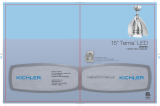 Kichler Lighting 300230NI User manual
Kichler Lighting 300230NI User manual
-
Kichler 300209OBB Installation guide
-
Kichler 300322NI User manual
-
Kichler Lighting 300020AP User manual
-
Kichler 300395 56 Inch Icon Indoor Ceiling Fan White User manual
Other documents
-
Satellite Electronic 36770516 User manual
-
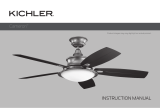 Kichler Lighting 310204WCP User manual
Kichler Lighting 310204WCP User manual
-
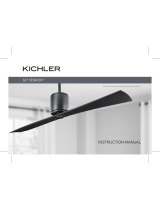 Kichler Lighting FERRON User manual
Kichler Lighting FERRON User manual
-
Kichler Lighting 300256BSS User manual
-
Beliani IRTISH Operating instructions
-
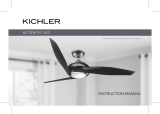 Kichler Lighting 300200PN User manual
Kichler Lighting 300200PN User manual
-
Beliani ceiling fan Operating instructions
-
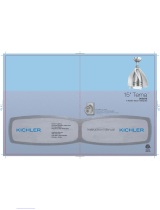 Kichler Lighting Terna 300215 User manual
Kichler Lighting Terna 300215 User manual
-
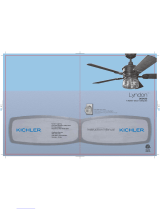 Kichler Lighting Lyndon 300120 User manual
Kichler Lighting Lyndon 300120 User manual
-
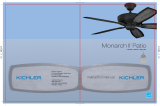 Kichler Lighting 310103DBK User manual
Kichler Lighting 310103DBK User manual


































































